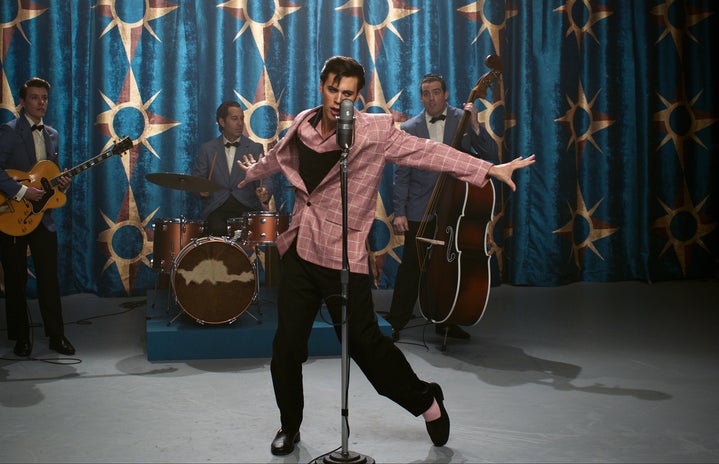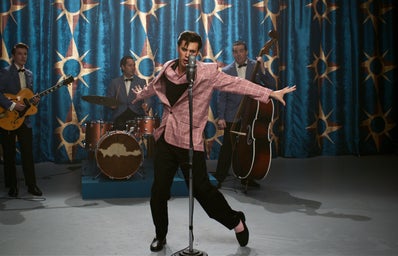The musical drama “Elvis” by Baz Luhrmann contains all the pomp and circumstance one would anticipate from portraying Elvis Presley’s legendary life in cinema. An overly drawn-out narrative jumble as excessive as one of the King’s fried peanut butter and banana sandwiches is at the crux of the relationship between Elvis (Austin Butler) and his infamous manager, Colonel Tom Parker (Tom Hanks). But thanks to Butler’s incredible performance, it never becomes boring and is almost always amusing. The musical pieces frequently sparkle thanks to Luhrmann’s distinctive approach. And the story covers a lot of Presley’s life, for better or worse. When it’s all said and done, you’re still unsure of what Hanks is doing.
1. Elvis and His Manager are the Subjects.
Colonel Tom Parker, who claims to have found and introduced Elvis to the world, speaks at the beginning and end of the movie. Parker, though, is troubled by Presley’s untimely passing. He even experiences nightmares. In one of Parker’s visions, a newscaster states, “Many believe that Colonel Tom Parker was responsible for the killing of Elvis Presley.” Despite Parker’s insistence that he and Presley “were partners,” the movie, which is largely narrated by Parker, accuses him of Presley’s death. Parker has a demanding schedule on the trip. Parker also provides Elvis medication when he becomes too exhausted to continue.
Elvis says he wants to go abroad because it may earn him $1 million for each performance. Parker, however, obstinately rejects this notion and instead makes a deal with a casino in Las Vegas, which secretly consents to forgive Parker’s gambling debt. (Incredibly, Elvis only performed abroad three times, all of them were in Canada.)
Elvis actor Austin Butler and Parker actor Tom Hanks both excel in their respective parts.
2. It’s the Gospel as well as Rock & Roll.
In the movie, Elvis is referred to as the “King of Rock and Roll” and is shown to appreciate gospel music in addition to blending “white country” with “black rhythm and blues.” An energetic tent revival with a predominately black congregation is being held early in the film, and we get to see a young Elvis slip into it. Elvis loses himself in the experience, shivering as though he is enthralled by the Spirit, like a few other people in the tent. We catch glimpses of Elvis’ passion for gospel music throughout the rest of the movie. He visits Beale Street and hears a woman singing, “I’m going to heaven to earn my reward.” He declares to Priscilla, “That’s the music that makes me happy,” as he listens to Mahalia Jackson perform a gospel song. While performing his most well-known songs for a television special, he requests the right to sing gospel music. Elvis received a Grammy for singing “How Great Thou Art” live.
Elvis’ music was adored by both black and white youths, and it helped close the gap between races. The Civil Rights movement of the 1950s and 1960s serves as the plot’s backdrop. “The Lord provides us music to unite people,” Elvis’ mother claims in the opening moments of the movie.
3. It’s Tragic and Gripping.
Elvis is a third tragedy, the third piece of music history, and a third performance.
You support him as he gains popularity and makes the commitment to earn enough money to buy his parents a nice, spacious home. As he performs at each performance, you applaud him as he progresses from an undercard artist to a headliner. His mother gives him bad counsel by endorsing his sensuous gyrations by saying, “The way you sing and move is God-given, so there can’t be anything wrong with that.” A different conclusion can be drawn from the lustful teen girls’ reactions.
The movie is a spectacle, and Austin Butler’s performance is worth seeing in the cinema because he is on the rise of becoming a new great actor. You can’t help falling in love with the music, Butler’s transformation into a legend, and Luhrmann’s signature flourishes.


